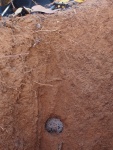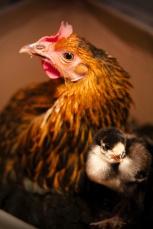 Ants have been farming for far longer than humans have existed. They discovered fungus farming around fifty or sixty million years ago in the wet rainforests of South America, and have continued tending their underground fungus gardens through countless years as the planet changed and changed, and changed again. Much more recently — just a few years ago — I wrote about the fungus-farming ants (called “attine ants”), trying to imagine how they might view human agriculture. Our imaginary attine author closed with the hope that studying humans might help the attines understand their own history, “such as how the transition from primitive to advanced agriculture occured in our own ancestors”, and now a study by a group of humans has shed light on that very question. Continue reading
Ants have been farming for far longer than humans have existed. They discovered fungus farming around fifty or sixty million years ago in the wet rainforests of South America, and have continued tending their underground fungus gardens through countless years as the planet changed and changed, and changed again. Much more recently — just a few years ago — I wrote about the fungus-farming ants (called “attine ants”), trying to imagine how they might view human agriculture. Our imaginary attine author closed with the hope that studying humans might help the attines understand their own history, “such as how the transition from primitive to advanced agriculture occured in our own ancestors”, and now a study by a group of humans has shed light on that very question. Continue reading
The Origins of Ant Agriculture
20 Thursday Apr 2017
Posted in Arthropods, Climate, Evolution, Hymenoptera, Insects





You must be logged in to post a comment.